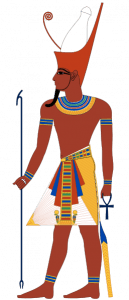Thus spoke Hamlet, after his ghostly father has revealed to him that his brother, Claudius, has murdered him, making the foul deed appear accidental. Claudius then, smilingly, has married Hamlet’s mother. This very well known Shakespearean trope is an appropriate entrée into today’s subject of villainy, past and modern. I am writing this essay only two days before the church’s celebration of Epiphany, that day when the magi appear out of the East, following the mysterious star, and come to Bethlehem to worship the Messiah, who has been born according to several Hebrew Bible “prophecies”. It is Jesus’ appearance, his “epiphany,” manifested to the gentile Magi that occasions the yearly celebration.

But this year I wish to focus on the villain of the piece, the wily, dastardly, and desperate Herod, known as the Great. Matthew 2 tells the gripping story. (Note: I find very little if any of the details of this account to have much historical root, and think that conversations about Super Nova, planetary convergences, Zoroastrian speculations, and other pseudo-historical notions to be quite beside the point—Matthew 2 is story, pure, simple, and quite pointed in its purpose.) The Magi from the East (great events in the Bible regularly spring up in the east, from Cain’s ultimate abode to the east wind that blows the waters of the Sea of Reeds back to its regular flow to Jonah’s desiccating east wind above Nineveh, the east is the unique place of divine activity) first come to Herod, innocently asking the King of Judah where they might find the child who has been born “king of the Jews.” Unsurprisingly, Herod is immediately “frightened,” along with “all Jerusalem,” and commands that all “chief priests and scribes” assemble to tell him just where the Jewish Messiah is to be born. Quoting the prophet Micah, they tell the king that Bethlehem will be the spot, whereupon Herod calls the Magi back to him to ask them exactly when the strange star appeared to them.
After learning that piece of information, the clever king sends the Magi off to Bethlehem, asking them to discover the precise location of this promised child, desiring, he says, also “to go and pay him homage.” It hardly takes a clever mind to discern that what Herod wants in fact is to destroy this so-called king of the Jews. There already is a king of the Jews, and Herod is it. Nonetheless, the Magi, imagining that they are performing the king’s bidding, helping him to worship the new Messiah, head to Bethlehem with their famous gifts. They are led directly to the place of Jesus’s birth by the magical star that stops right over the house of the child. After their gift-giving and worship, the Magi think they will go back to Herod and report the location of the Messiah, but “being warned in a dream,” a very common feature of Matthew’s Gospel, they return home “by another road.”
More dreaming soon occurs, as Joseph hears from an angel that Herod, far from wishing to worship the child, in reality desires the child’s death, takes the baby and his mother and heads to Egypt, awaiting the death of the cruel Herod. The Jewish king, infuriated by the trickery of the Magi, demands that all children in and around Bethlehem who are two years old or younger are to be slaughtered in order to ensure the death of the would be king of the Jews. This genocide fulfills the terrible text from Jeremiah that describes a “wailing and loud lamentation, Rachel weeping for her children.” The horrors of the massacre are in the end a failure; Herod dies, and Joseph, Mary, and Jesus return from Egypt, moving to the northern town of Nazareth to escape the potential ravages of the new king of Judah, Archelaus, Herod’s son. Herod is without doubt a most damnable villain, but anyone who has read the central story of the Hebrew Bible knows of another very similar villain on whom the evil Herod is certainly based.
 The unnamed pharaoh of Egypt, master of the mighty slave gangs that are building huge grain storage places for Egypt, is said to have a special problem with a small contingent of his slaves. The Hebrews have the unique ability to thrive and grow even while they are worked nearly to death for their Egyptian overlords. Indeed, “the more (and the longer) they worked the more they grew numerous and spread abroad.” Like rabbits, the Hebrews continued to defy the attempts of the pharaoh to slow their growth, and grew “numerous and mighty.” Finally, in a desperate attempt to stop their baby-making abilities altogether, pharaoh demands “every child that is born shall be thrown in the Nile!” The Greek text of the verse adds the phrase “to the Hebrews,” making somewhat more rational the terrified pharaoh’s commandment. But that is just the point; this pharaoh is far from rational. He commands the murder of all male babies, whether Egyptian or Hebrew, in the desire to control the fecund Hebrews. Just like the near insane Herod, pharaoh seeks genocide to solve his perceived problem.
The unnamed pharaoh of Egypt, master of the mighty slave gangs that are building huge grain storage places for Egypt, is said to have a special problem with a small contingent of his slaves. The Hebrews have the unique ability to thrive and grow even while they are worked nearly to death for their Egyptian overlords. Indeed, “the more (and the longer) they worked the more they grew numerous and spread abroad.” Like rabbits, the Hebrews continued to defy the attempts of the pharaoh to slow their growth, and grew “numerous and mighty.” Finally, in a desperate attempt to stop their baby-making abilities altogether, pharaoh demands “every child that is born shall be thrown in the Nile!” The Greek text of the verse adds the phrase “to the Hebrews,” making somewhat more rational the terrified pharaoh’s commandment. But that is just the point; this pharaoh is far from rational. He commands the murder of all male babies, whether Egyptian or Hebrew, in the desire to control the fecund Hebrews. Just like the near insane Herod, pharaoh seeks genocide to solve his perceived problem.
In fact, the two stories show any number of parallel ideas. Both present rulers with a problem; both rulers are afraid of losing power; both resort to massacre to retain power; in the face of the raging ruler, the Hebrews escape Egypt, while in the Matthew story, the holy family head toward Egypt to escape; eventually, at the death of the monarch, the holy family, like their ancestors before them, return to the land of promise at the behest of the God who protects them. And, of course, along the routes of the Hebrews and the holy family, God is there, in pillar of cloud and fire, at the division of the waters, in the dangerous wilderness, in the flight to Egypt and the return from there. These two tales are orchestrated by the God of Israel, the God of Jesus. The villains are cruel, determined to stay in control, but in both cases their supposed control is illusory and fails completely in the end.
Last Saturday, Jan.2, 2021, a modern villain showed his true and desperate colors to a horrified nation. Donald J. Trump, the 45th president of US America, a mere 18 days from vacating the White House after his defeat by Joe Biden and Kamala Harris in an election judged among the very most secure in the nation’s history, spent an hour on the phone with the Secretary of State of the state of Georgia in the astonishing attempt to coerce him to “discover” some 11,500 votes for Trump, enough to swing the state back into his electoral column. The president used various ploys to make this illegal action occur; he pleaded, cajoled, and threatened the election official, finally demanding that he, the Secretary of State, might be found to be acting illegally if he did not knuckle under to Trump’s demands. Mr. Raffensburger, calmly rejected Trump’s appalling and ridiculous demands, telling the president that he had his “facts” wrong, that there were no faulty machines, no “ballot dumps,” no dead person votes, no signature problems. The Georgia vote for president had been recounted three times, once by hand, and had been certified as devoid of problems. He had no intention of changing the fair election in Trump’s favor, and plainly told the president that.
This phone call by Donald Trump was nothing less than evil, an illegal attempt to coerce an election official, a malicious demand to alter the facts of the basic tenet of Us American democracy, the free and fair vote of its citizens. With that phone call, Mr. Trump joins the rogue’s gallery of pharaoh and Herod, vainly trying to retain a power that was no longer theirs. Like pharaoh and Herod, Trump is now a part of history, a past leader, a once-powerful wielder of authority, but who now must shift all his verbs to the past tense. Yet, like pharaoh and Herod, Trump should be reviled, vilified by all those who love justice and equity, who believe that all people, in the sight of God, have equal access to fair play in a democratic society. It is from that vantage point that we have judged pharaoh and Herod to be villains, men who cared little for what is just and right, content in their absolute power. In our democracy, such absolute power never exists, and when we witness power’s obvious abuse, we name it directly and forcefully. Donald Trump now joins the ranks of the villains of our history, and future generations should see him as precisely that.
(images from Wikimedia Commons)











